
Sherpa guides on Sunday recovered bodies of three Indian climbers from Mount Everest amid reports of climbers being put at risk by the mysterious disappearance of oxygen bottles during the difficult climb to the summit. However, no link has been found between the two incidents.
Sherpa guides have brought down the bodies of climbers Ravi Kumar, Paresh Chandra Nath and Gautam Ghosh from a camp at a lower elevation to Kathmandu for post-mortem.
"It is becoming a serious issue up there... I kept on hearing from expedition groups that their oxygen bottles had disappeared and that could be life-threatening - particularly when they have used up what they are carrying on their way up and they are still not on the summit yet, or they plan to use the stocked bottles on their way back," mountain guide Nima Tenji Sherpa told the BBC on Friday.
"Another 7 bottles of Os have gone missing from our supply - this time from The South Col," Everest Expedition leader Tim Mosedale wrote on Facebook last week, referring to the location of one of the mountain's final camps before the summit.
While talking about the high number of "failed summit bids" and the five deaths that happened on the mountain so far this year, Mosedale said that it would not come as a surprise if the oxygen bottles were stolen to help those in need but he wished that "people would let us know," the Washington Post reported.
"No one in their right mind would withhold previous oxygen from any team/climber having difficulties. But if those difficulties are as a result of their own oversight or lack of sufficient supply, it's a difficult situation to reconcile - especially when it potentially affects the success or otherwise of our own team. Indeed, as I've mentioned before, lack of sufficient oxygen can easily develop into a life-threatening situation," he added.
After Mosedale found out that four of his group's oxygen bottles went missing from another camp, he wrote on Facebook: "I'd never normally wish ill on anyone but if these thieving bastards don't summit, or get frostbite in the process, then that's karma."
![Google executive Daniel Fredinburg was among 17 mountaineers who were killed in an avalanche on Mt. Everest caused by the 7.9 magnitude earthquake in Nepal. [Representational Image] Google executive Daniel Fredinburg](https://data1.ibtimes.co.in/en/full/570639/google-executive-daniel-fredinburg.jpg?h=450&l=50&t=40)
However, this is not the first time oxygen bottles have been stolen or have gone missing. At least two climbers, including an Indian police official, complained about their oxygen bottles being stolen during the climb. "A large number of oxygen cylinders were stolen," Rudra Prasad Haldar told the Hindustan Times.
The issue has become so common this year that it is being called a "trend" by the Nepal National Mountain Guides Association, the Washington Post reported.
"Because of such incidents, climbers have had to return without reaching the summit, because when you learn that you no more have the life-saving bottles, the first thing you want to do is get back to the base camp," Phurba Namgyal Sherpa, the association's general secretary, told the BBC.
Even though it is possible to reach the summit of Everest without oxygen, it is not recommended due to the extreme weather conditions on the mountain. The air at the mountain's peak can sustain life for only a few hours. Lack of oxygen can cause serious frostbite and a condition called hypoxia that affects the brain resulting in headaches, hallucinations and eventually death.
However, authorities have said that no one has been caught stealing oxygen bottles and that there are no likely suspects with regard to the problem either.

















